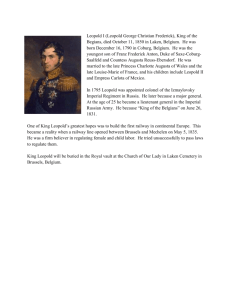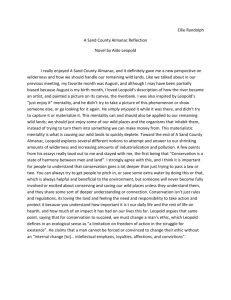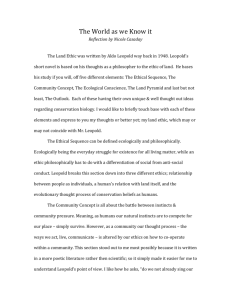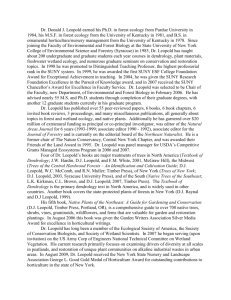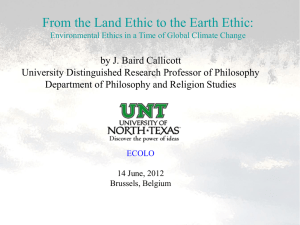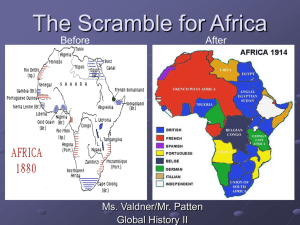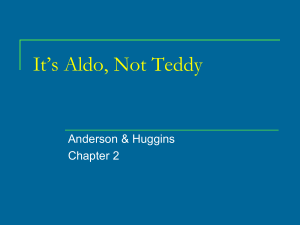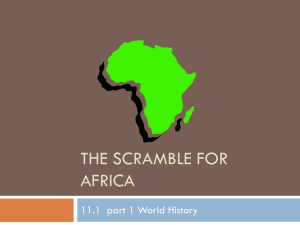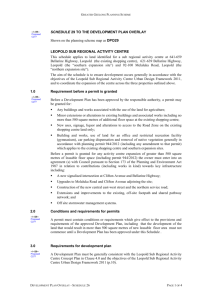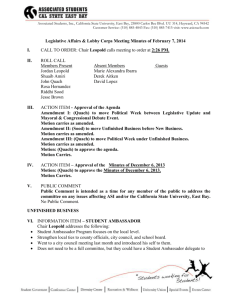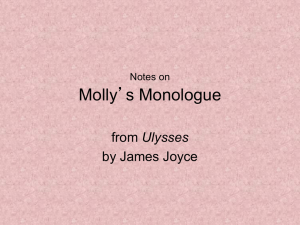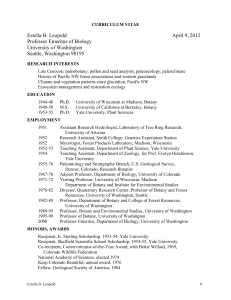File
advertisement
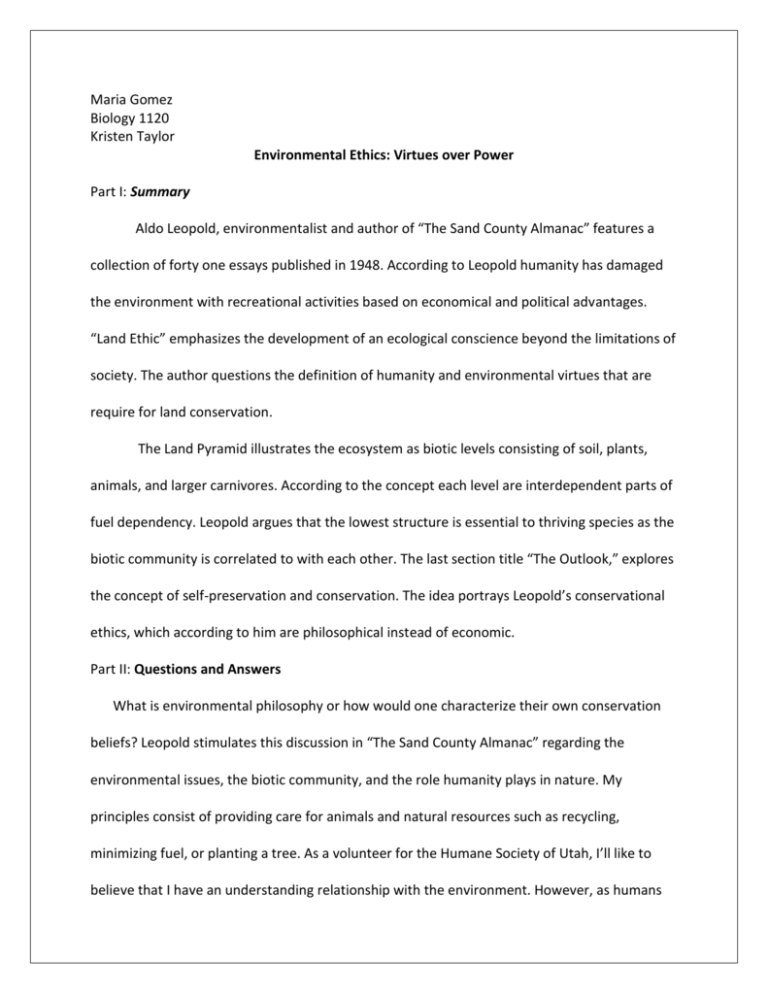
Maria Gomez Biology 1120 Kristen Taylor Environmental Ethics: Virtues over Power Part I: Summary Aldo Leopold, environmentalist and author of “The Sand County Almanac” features a collection of forty one essays published in 1948. According to Leopold humanity has damaged the environment with recreational activities based on economical and political advantages. “Land Ethic” emphasizes the development of an ecological conscience beyond the limitations of society. The author questions the definition of humanity and environmental virtues that are require for land conservation. The Land Pyramid illustrates the ecosystem as biotic levels consisting of soil, plants, animals, and larger carnivores. According to the concept each level are interdependent parts of fuel dependency. Leopold argues that the lowest structure is essential to thriving species as the biotic community is correlated to with each other. The last section title “The Outlook,” explores the concept of self-preservation and conservation. The idea portrays Leopold’s conservational ethics, which according to him are philosophical instead of economic. Part II: Questions and Answers What is environmental philosophy or how would one characterize their own conservation beliefs? Leopold stimulates this discussion in “The Sand County Almanac” regarding the environmental issues, the biotic community, and the role humanity plays in nature. My principles consist of providing care for animals and natural resources such as recycling, minimizing fuel, or planting a tree. As a volunteer for the Humane Society of Utah, I’ll like to believe that I have an understanding relationship with the environment. However, as humans we tend to be materialistic and egotistical, often when particular objectives are displayed between ecological and economic issues. Leopold discuses this barrier that society benefits themselves with the land only when it’s profitable, but are disregarded once the resources are deem undesirable. In 1872 Congress established Yellowstone National Park to preserve the region from spoliation, which began the movement to restore national parks worldwide. According to Leopold’s perspective recreational parks were fashioned to illustrate the grandeur of the land, rather than be displayed for profit. Leopold argues that ethical obligation is witness when commercial value is present and that National Parks do more harm than good. I believe that society has a moderate relationship with the land when barriers of political and environmental circumstances are debated. Leopold states “A land ethic changes the role of humans from conqueror of the land community to plain members and citizens of it. It implies respect for his fellow-members, and also respect for the community as such,” (Leopold, 1949) his philosophy extends the boundaries between animals, nature, water, plants, and land. I thought a mutual relationship was between the environment and animals; I never visualize Leopold’s idea about forming a spiritual value with other resources of our biotic system. Our role as humanity is to preserve the environment by improving the quality of our natural resources and the damages inflicted. As a volunteer for the Humane Society of Utah, I’ll like to imaging that I contribute to our community. There are occasions that I don’t have direct interaction with any animal, but the smallest actions often make a great impact, such as cleaning the cages or washing food bowls. My belief is that as global citizens our responsibility lies within the environment and society. Leopold argues that a balance for specific foundations should be considered, as both are essential. In land ethic Leopold states “A thing is right when it tends to preserve the integrity, stability, and beauty of the biotic community. It is wrong when it tends otherwise.” The concept, in my opinion, reflects nature as another member of society that shouldn’t be disregarded or corrupted from the purity that the environment has. Leopold believes that humanity should have consideration for the land, by giving the same respect that is essential given to a member of society. As Leopold states “It is inconceivable to me that an ethical relationship [with land] can exist without love, respect, admiration, and a high regard for its value,” that is categorized by aesthetics and ethics. Aesthetics and ethics I believe are essential, what is beauty if it’s not flourishing or lacks purity. I also think that people should provide care for our environment. Humanity is a concept that is broad, upon reading Aldo Leopold’s essay I thought of diverse issues in “land ethic.” Leopold discusses the concepts of materialism and corruption with past historical references; portraying humans as conquers that eventually demolish their surroundings. I believe that there should be equilibrium of limitations or balance between our biotic communities by forming spiritual values with natural resources. In America significant events altered the territories and lifestyle of society, for example the Dust Bowl and the nearextinction of the buffalo by the Native Americans. There is no self-preservation if there is damaged to the ecology and agriculture that civilization relies on. Part III: Critique It’s evident that Leopold and Carson are two significant environmental books published that impacted the perspective on environmentalism. The authors establish conservational issues in respect to the human relationships between animals, land, and nature. Leopold’s book illustrates similar concepts to Henry Thoreau and Rachel Carson, the books share philosophical ideas and were passionate naturalist that establish controversial ideologies in America. The concept of “nature equality” was question and environmental virtues within society were emphasized. Rachel Carson, author of Silent Spring declared that “Our heedless and destructive acts enter into the vast cycles of the earth and in time return to bring hazard to ourselves” (Griswold, 2012). Carson established an environmental movement for society to acknowledge the damage of pesticides entering the biosphere and eventually compromising every living species. The same ideologies appear in Land Ethics, Leopold defines philosophical concepts within nature. The essay establishes one to question the role and relationship within the environment as well, are we citizens of the reclusive community or do we have global awareness? I believe that as people, who are capable of protecting and manufacturing diverse products its essential our responsibility to maintain the environment and the beings that inhabit it, both human and non-human. As a global society, our objective should be to preserve the quality of the environment. WORKS CITED Griswold, Eliza. “How Silent Spring Ignited the Environmental Movement”. The New York Times. 2012. Leopold, Aldo. “A Sand County Almanac, With Essays on Conservation from Round River.” Toronto: The Random House Publishing Group.1949. Print.
